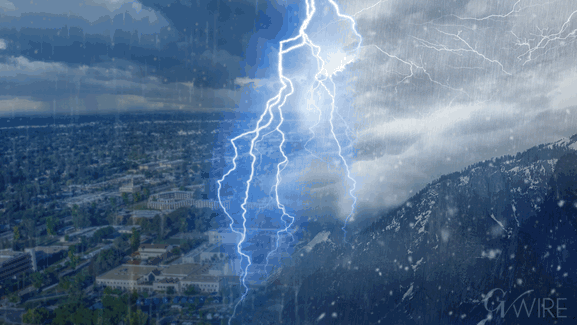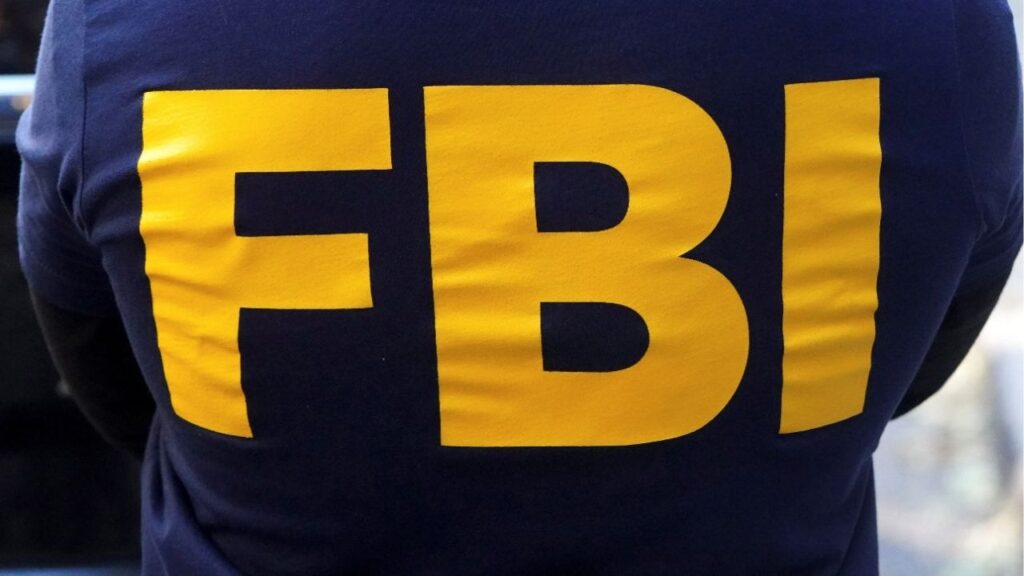President Donald Trump and UAE President Mohammed bin Zayed Al Nahyan arrive at Qasr Al Watan, Thursday, May 15, 2025, in Abu Dhabi, United Arab Emirates. (AP/Alex Brandon)

- Joe Kent urged intelligence officials to rewrite a memo to align with Trump’s claim linking Venezuela to a violent gang.
- Internal emails reveal pressure to reshape intelligence, raising concerns of politicized interference by Trump’s DNI chief of staff.
- Final memo, altered under political pressure, still contradicted Trump’s claims and fueled legal challenges to his deportation policy.
Share
|
Getting your Trinity Audio player ready...
|
WASHINGTON — New emails document how a top aide to Tulsi Gabbard, the director of national intelligence, ordered analysts to edit an assessment with the hope of insulating President Donald Trump and Gabbard from being attacked for the administration’s claim that Venezuela’s government controls a criminal gang.
“We need to do some rewriting” and more analytic work “so this document is not used against the DNI or POTUS,” Joe Kent, the chief of staff to Gabbard, wrote in an email to a group of intelligence officials on April 3, using shorthand for Gabbard’s position and for the president of the United States.
The New York Times reported last week that Kent had pushed analysts to redo their assessment, dated Feb. 26, of the relationship between Venezuela’s government and the gang, Tren de Aragua, after it came to light that the assessment contradicted a subsequent claim by Trump. The disclosure of the precise language of Kent’s emails has added to the emerging picture of a politicized intervention.
Memo Contradicts Key Claim
The final memo, which is dated April 7 and has since become public, still contradicts a key claim that Trump made to justify sending people accused of being members of the gang to a notorious Salvadoran prison without due process.
Emails on the topic from Kent, who is also Trump’s pending nominee to lead the National Counterterrorism Center, have circulated within the intelligence community and were described by people briefed on them. Kent’s interventions have raised internal alarms about politicizing intelligence analysis.
Defenders of Kent have disputed that his attempted intervention was part of a pressure campaign, arguing he was trying to show more of what the intelligence community knew about the gang.
But the disclosure of his emails supports the accounts of critics who said he was applying political pressure to generate a torqued narrative that would support, rather than undermine, the administration’s policy agenda.
The issue centers on Trump’s invocation in March of a rarely used wartime law, the Alien Enemies Act, to summarily deport people accused of being members of the gang. After several planeloads of such transfers, courts have blocked any further use of the law for now.
Act Enacted in 1798
The act, enacted in 1798, allows the government to remove citizens of a country that is in a declared war with the United States or otherwise invading U.S. territory. On its face, it appears to require a linkage to the actions of a foreign state, and Trump summoned such a link into existence in a proclamation on March 15.
“TDA is undertaking hostile actions and conducting irregular warfare against the territory of the United States both directly and at the direction, clandestine or otherwise, of the Maduro regime in Venezuela,” Trump declared, referring to the gang. “I make these findings using the full extent of my authority to conduct the Nation’s foreign affairs under the Constitution.”
But the U.S. intelligence community believes that the opposite is true: The gang is not controlled by the administration of Venezuela’s president, Nicolás Maduro, nor committing crimes in the United States at its direction, according to the two assessments by the National Intelligence Council.
The council is an elite internal think tank that reports to the Office of the Director of National Intelligence. It undertakes analytical projects at the request of policymakers, relying on information collected by agencies like the CIA, the FBI and the National Security Agency.
The White House requested the original assessment in February as it was preparing Trump’s Alien Enemies Act proclamation. Even after the council produced its first assessment, Trump proceeded to sign the proclamation that put forward the opposite claim in order to activate wartime deportation powers.
The disconnect first came to light in a March 20 Times article that reported on the existence of the Feb. 26 memo and detailed why the intelligence community had reached its conclusion. The Times also reported that the FBI partly dissented and thought there were some links between the gang and Venezuela’s government based on information that the rest of the country’s spy agencies thought was not credible.
Trump Administration Reacts
The Trump administration reacted with alarm to the disclosure of the intelligence assessment. On March 21, a Friday, Todd Blanche, the deputy attorney general — who is also a former criminal defense lawyer for Trump — issued a statement saying the Justice Department was opening a criminal leak investigation while also portraying the Times article as inaccurate.
The following Monday, March 24, Kent sent an email to several people, including Michael Collins, then the acting head of the National Intelligence Council. Attaching a copy of the Times article to his message and telling the team to look at it, Kent said it was necessary to “rethink” the assessment, according to multiple people who described it.
“Flooding our nation with ‘migrants’ and especially ‘migrants’ who are part of a violent criminal gang is the action of a hostile nation, even if the gov of Venezuela isn’t specifically tasking or enabling TDA’s operations,” Kent wrote, according to the people briefed on the email.
Kent’s comment that the Maduro administration wasn’t “tasking or enabling” the gang’s operations appears to be a concession that Trump’s claim might be doubtful. But Kent doubles down on the idea that Venezuela had taken advantage of Biden-era immigration policies to allow migrants, including gang members, into the United States.
Kent wrote that the council needed to produce a new assessment on the topic that would reflect “basic common sense” by the end of the week, saying he wanted to understand how any agency had concluded that Venezuela’s government was not orchestrating Tren de Aragua’s actions in the United States.
The precise language of Kent’s March 24 email was reported earlier by Reuters.
Collins agreed to start work on a new council assessment, according to the people familiar with the exchange.
Collins, Kent Exchange Several Emails
Collins and Kent exchanged several emails on April 3 and April 4. But in one long email on April 3, Kent asked for changes, arguing that it wrongly, in his view, made it sound as if the Venezuelan government had no connections to the gang.
“Let’s just come out and say TDA leaders are given sanctuary in Venezuela as their gang members commit horrendous crimes in America, then we can provide the context about our exact knowledge of relationship between TDA and the Venezuelan government,” Kent wrote.
He also argued the assessment did not do enough to describe the situation on the border and Biden administration policies that he believed had made it too easy for migrants to enter the United States. He characterized former President Joe Biden as having announced that the border was open and having turned Customs and Border Protection into a “travel service for illegals.”
“TDA didn’t need logistical support from the Venezuelan government because Biden provided it for them,” Kent wrote. “I understand some may view this as political, but it’s not.”
Kent ended the email by writing he wanted a version by the end of the week that could be declassified and provided to the White House team led by Stephen Miller, the architect of the Trump administration’s anti-immigration policy.
On April 3 and 4, in a series of emails, the two men collaborated on various proposed edits to the document, Kent pushing for more about the impact of border policy on migration, and Collins agreeing to some edits.
Officials from the Office of the Director of National Intelligence declined to comment on Tuesday.
Kent is said to have reacted happily to the final version of the second memo and ordered it declassified so that it could be discussed publicly, setting in motion a chain of events that led to its public release on May 5 in response to a Freedom of Information Act request.
Notwithstanding Kent’s happiness with Collins’ final work, the second memo still contradicts what Trump said and its official disclosure has been a legal and political problem for the Trump administration. Gabbard has since fired Collins and his deputy at the National Intelligence Council, bashing them as biased, deep-state bureaucrats.
—
This article originally appeared in The New York Times.
By Charlie Savage, Julian E. Barnes and Maggie Haberman
c. 2025 The New York Times Company



















